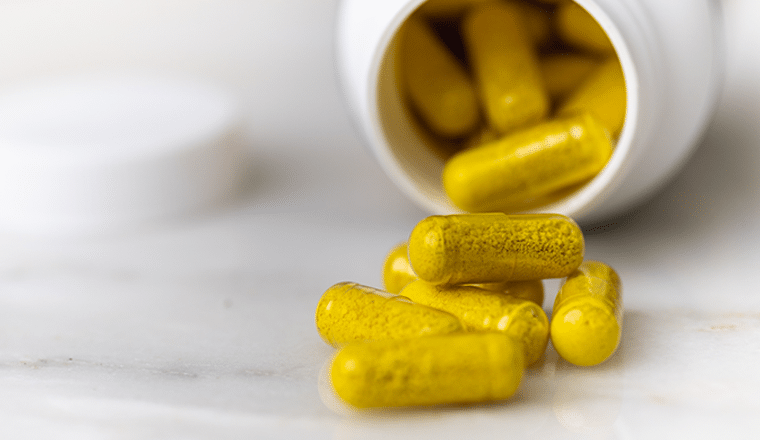Last updated on September 25th, 2025 at 04:13 pm

The search for natural remedies for a variety of health concerns is seemingly at an all-time high. And while many herbs and their bioactive compounds have been used for thousands of years in traditional medicine, few have the modern research to back up their claims.
But one such natural compound that has several evidence-based health benefits is berberine. In this article, we’ll take a look at the many ways berberine may support your health, including potential benefits for metabolism, gut health, blood sugar, and more.
What is Berberine?
Berberine is a natural compound called an alkaloid. It is found in several plants, such as Chinese goldthread, Oregon grape, barberry, and goldenseal. It has a long history of use in Traditional Chinese Medicine and other traditional medicine systems, especially to help treat infections and support digestive health.
What does Berberine Do in the Body?
Since berberine is promoted as a valuable health compound, you’re likely wondering, “What does berberine do in the body?”
Well, like other alkaloids, berberine exerts many different biological effects in the body. It has numerous pharmacological properties that may contribute to health benefits.
One of the primary actions of berberine is to activate AMP-activated protein kinase (AMPK), which is sometimes referred to as the “metabolic master switch” because of the pivotal roles it has on metabolic functions, such as insulin sensitivity, glucose uptake and utilization, and fat oxidation.
In addition, berberine has many other actions too, such as supporting the gut microbiome, helping remove LDL cholesterol, and helping to combat inflammation, among several others.
Potential Health Benefits
Berberine has several health benefits backed by research, which are owed to its biological activities. The main evidence-based benefits of berberine are:
- Blood sugar support: Berberine promotes insulin sensitivity, supports glucose metabolism, and may inhibit glucose formation in the liver. All of these effects support healthy blood sugar levels.
- Promotes healthy cholesterol: Berberine may inhibit cholesterol absorption in the gut, helps regulate cholesterol removal, and promotes fatty acid metabolism. Together, these effects promote healthy cholesterol levels and a more balanced HDL to LDL ratio.
- Gut health support: Berberine has been shown to help balance gut bacteria and support overall gut microbiome health. Its general anti-inflammatory and antimicrobial actions also support gut health.
- Weight management: By supporting general metabolic health, blood sugar, and cholesterol, berberine may help contribute to a healthier weight and fat reduction.
- Heart health support: Berberine supports healthy blood pressure, helps combat inflammation, and supports healthy cholesterol levels, all of which support a healthy heart.
Side Effects and Considerations
Berberine is generally considered safe when used in the recommended dosages, which is typically between 500 and 1,500 mg per day, divided into two to three doses.
Natural compounds still have possible side effects. The most common side effects of berberine are:
- Nausea
- Constipation
- Diarrhea
- Upset stomach
- Stomach cramps
Also, due to its pharmacological activities, berberine may interact with various medications, such as blood thinners and medications for blood sugar and blood pressure.
It may not be safe for everyone. For example, pregnant and breastfeeding women should avoid it. Always talk to your doctor before starting any supplement.
Top Berberine Supplements
There are hundreds of berberine supplements to choose from, which can make it difficult to know which ones to buy. Listed below are three top berberine supplements that stand out for their purity, potency, and overall quality:
- Thorne Research Berberine: Thorne Research is one of the most trusted supplement brands, providing numerous evidence-based products for many health goals. Each serving of Thorne Berberine offers 450 mg of berberine HCl and 550 mg of berberine phytosome. This potent dose is a great way to support metabolic health and all-around wellness.
- NutriDyn Berberine Pro: You can always count on NutriDyn for rigorously tested, evidence-based supplements. Berberine Pro is formulated with 500 mg of berberine HCl along with organic cinnamon extract. This combination promotes balanced blood sugar levels, while supporting a healthy heart and other key areas of well-being.
- MaryRuth’s Organics Berberine Capsules: MaryRuth’s Organics offers an impressive array of pure and potent health supplements. Their Berberine Capsules product provides 1 gram of berberine HCl per serving (2 capsules), making it a great way to support metabolic health, digestion, and more.
FAQs
Is berberine bad for kidneys?
Berberine is generally okay for kidneys, even in people with early stages of kidney disease. However, individuals who have severe chronic kidney disease and are on dialysis should avoid using berberine.
For the best individualized advice, the question “is berberine bad for kidneys” should ideally be answered by your doctor.
What does berberine do?
Berberine has many effects. It’s been proven in research to help with blood sugar, cholesterol, general metabolic health, gut health, heart health, and weight management. A lot of these benefits are due to berberine’s ability to activate an enzyme called AMPK
Can berberine cause diarrhea?
Yes, berberine may cause diarrhea in some individuals. It may also cause other gastrointestinal side effects, such as nausea or upset stomach.
When should you take berberine?
It’s best to split up the dose of berberine into two to three doses per day, ideally before or with meals.
- Cold and Flu Season Survival Guide: Practical Tips for Busy Families - November 24, 2025
- Stress, Sleep, and Digestion Support Tips for the Holidays - October 30, 2025
- What Essential Oils are Ideal for a Healthier Home? - October 22, 2025
* These statements have not been evaluated by the Food and Drug Administration. The products mentioned are not intended to diagnose, treat, cure, or prevent any disease.


